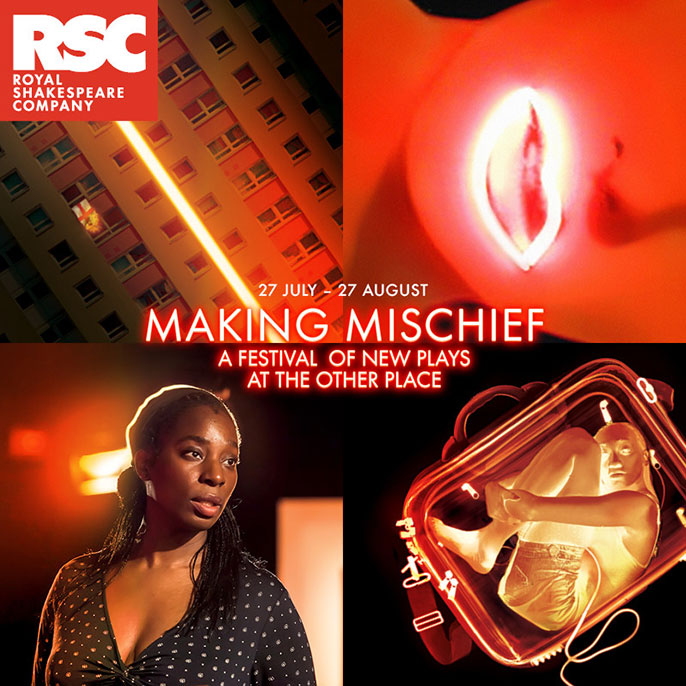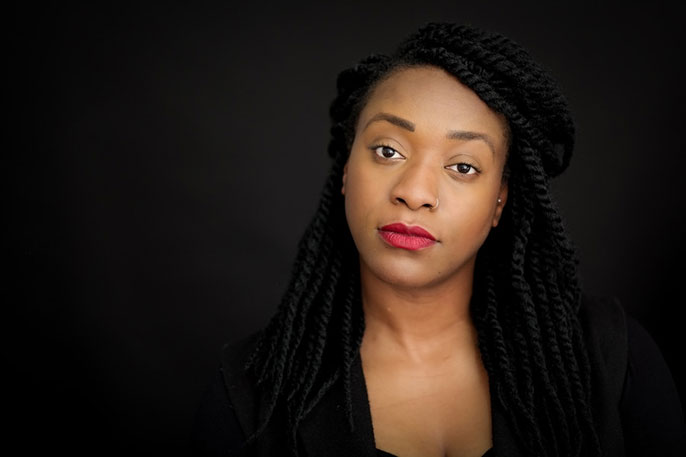Somalia Seaton – interview
Fall of the Kingdom, Rise of the Foot Soldier
Royal Shakespeare Company’s Making Mischief Festival
In the past three years, playwright Somalia Seaton’s feet have barely touched the floor. Since her debut play Crowning Glory [read review] put permanent waves in the modern drama sphere, the writer has been on a creative spin cycle. The writer has developed work for The Bush as part of her attachment to them and Talawa Theatre Company. She has also had work staged at The Yard, The Lyric and Soho Theatre. Despite her jam-packed schedule, Seaton has also managed to pursue her passion as an educator. The writer has acted as a mentor on various projects for emerging artists at the Lyric, Almeida and National Theatre.
My involuntary ‘Blimey!’ at Seaton’s astonishing resume provokes laughter from the Londoner, who concedes: “It has been crazy, but I am grateful to be doing what I love. I adore writing and I also love working with young people, so I’ve taken every opportunity to pursue both of those passions. It’s important for me to encourage the next generation of artists to get their work out there and make their voices heard.”
Seaton’s own voice has become highly audible to British audiences of late. This summer her play House in association with Clean Break will be touring at the Edinburgh Festival Fringe. The play exploring issues of religion, mental health and the criminal justice system will then be touring London in the autumn. But Scotland will have to wait, as Seaton is in Stratford-upon-Avon, preparing to debut her second full length work Fall of the Kingdom, Rise of the Foot Soldier. Seaton’s political play is showing as part of the RSC’s Making Mischief festival, being shown at the Other Place Theatre.
As Seaton explains, the piece is her response to the provocation ‘What is unsayable in the 21st century?’: “My initial answer was my belief that Neoliberalism is more detrimental to cultural harmony than the far right. What I mean by that is the common liberal rhetoric of us all being the same often denies experience. To deny experiences of oppression in a system is massively problematic and cements ideas of otherness. Nothing good comes from this.”
As founder of motivational youth initiative No Ball Games Allowed, Seaton has spent large amounts of time in schools. As such, the trained actress firmly believes in education as the individual’s foundation for their future.
I don’t know how to write anything other than things that are going to be uncomfortable. I feel such a strong desire to talk about things that could lead to conversations that evoke change.
She explains that this was one of the reasons she chose to set her current play in a school: “Academic settings often mirror the adult world in a number of ways, such as social groupings and shared attitudes. Most obviously, there is a majority controlled by a minority. I always knew I wanted to set the piece in a school, but I wasn’t sure what form the narrative would take. It’s eventually become a piece, which has the relationship between a teacher and a young girl at its centre. The student and the teacher are both trying to transition through an increasingly volatile society, where silence is becoming less common and conflict is imminent. They often both find themselves on opposite sides of the fence but fundamentally need each other in order to move forward.”
Whilst Seaton avoids revealing too much about the narrative, she is forthcoming when describing her inspirations for the piece.
The writer shares her belief that the current ‘Prevent’ strategy in schools is encouraging negative attitudes towards minorities: “The fact that teachers are required by law to report anyone who they believe could be becoming radicalised or holds extremist views could be potentially dangerous. A lot of friends of mine whom are teachers have found it hard to practice. Although it’s not overtly stating the type of people to be observed, there is a face associated with radicalisation, a face that has been repeatedly pushed through the media. In essence a face that has been criminalised before a crime has been committed. Essentially it runs the risk of criminalising brown bodies.”
The British Nigerian and Jamaican artist goes on to explain that this opened up various other conversations and debates. Seaton explains that current events also influenced her writing decisions.
In particular, at the time of her research, the attack on Charlie Hebdo had just occurred: “It’s an awful and inexcusable thing that an artist could go into work and lose their life. However the media and governments used this as yet another excuse to hijack the story to promote the familiar anti-Islam narrative. It’s so clever; rile up regular people, call them to arms and sit back and let them go to war for you.”

Seaton also questioned the use of satirical media as a supposedly subversive art form: “On a separate note, when I looked at the Charlie Hebdo publications, I questioned their apparent use of satire. Satire is supposed to be anti-establishment and challenge those in power, I had so many questions.”
Seaton acknowledges that this is a highly controversial subject matter, admitting: “I’d be lying if I said the magnitude of this subject didn’t scare the sh*t out of me. I feel we have been fed images of what we should be scared of and images of what we shouldn’t. That’s dangerous. Unless we discuss why we have these beliefs and explore the truth behind them, we will continue to live in this culture of fear and demonise those who are innocent.”
The writer has never been one to shy away from controversial topics. Her previous works have touched upon subjects of gender, race, beauty ideals and poverty.
We live in uncomfortable times where we increasingly need to reconnect with one another. We are helping people less. We are becoming complicit in violence; we are standing by and allowing things to happen. We are under surveillance and people don’t ask enough questions.
Despite the profound nature of her work, Seaton reveals that prior to Crowning Glory, she didn’t consider herself a proper writer: “I always felt that writing was something I did, but I didn’t feel like a writer. So having people respond so enthusiastically to my work has empowered me to continue searching for things of significance to talk about, and hopefully I can make a difference through that. I’ve become clearer on my vision as an artist.”
Seaton’s clearer vision and dedication to her work has enabled the writer to commit to her writing full time, which she says was a big step. The artist laughs as she lists her previous job roles, which include duty free perfume spritzer and a life model for a ‘Check your Breasts’ campaign. This being the second time I’ve interviewed Seaton, I notice she seems more forthright and if possible, even more motivated than three years ago. Most strikingly, the artist is a fascinating mix of jovial warmth and vehement socio-politicism.
She comments on her dedication to saying the unsayable, sharing: “I don’t know how to write anything other than things that are going to be uncomfortable. I feel such a strong desire to talk about things that could lead to conversations that evoke change. Essentially, I hope my work will encourage a shift in our collective psyche.”
This desire to evoke change is something Seaton shares with the play’s director Nadia Latif [read interview].
This being the first time the pair has worked together; Seaton shares her admiration for the director: “Nadia is so dedicated to her work. The number one concern when you’re approaching a play is ‘Is this director going to be as passionate about the subject matter as the writer? Are they going to care about it as much?’ Nadia, cares, she wants to have the conversation. We both have different objectives, we come from different places which I think is important. But fundamentally we’re passionate about these topics that the play explores.”
Naturally, the indefatigable Seaton is on a tight schedule and has to hurry back to the rehearsal room. I have left her with a mere ten minutes of her lunchbreak, and she’s barely time to grab a sandwich. Before I let Seaton hurry back to work, I ask her why people should come and see Fall of the Kingdom, Rise of the Foot Soldier.
She answers with cerebral fervour: “We live in uncomfortable times where we increasingly need to reconnect with one another. We are helping people less. We are becoming complicit in violence; we are standing by and allowing things to happen. We are under surveillance and people don’t ask enough questions. And because people are walking out into the street and murdering people in broad daylight. Jo Cox was murdered on her home soil by a terrorist and we’re not calling him a terrorist. Why? That’s why it’s crucial in times like these, fearmongering, and desperate times. We need to have a conversation about why these things are happening. Sooner rather than later.”
Info: Fall of the Kingdom, Rise of the Foot Soldier is at the Studio Theatre, The Other Theatre, Stratford Upon Avon from 27 July to the 27 August | Book tickets | Find out more about Somalia Seaton’s play House
Related Links
Somalia Seaton interview – Crowning Glory
Review – Crowning Glory by Somalia Seaton


























